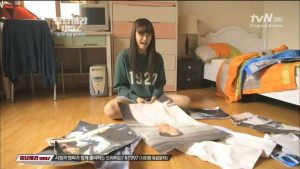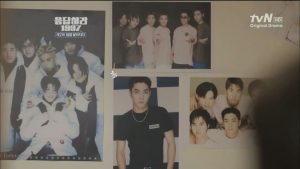Curious to know more about various social climates represented in Reply 1997? Read our essays to dive deeper into the themes of this drama, including SNS/online interaction, LGBTQ issues, and family relations in South Korea.
1. Abstract: Reply 1997 is a drama series that follows the lives of six friends in Busan and is structured by extended flashblacks that move between 2012 and 1997. These six friends, who are part of the sinsedae, go though a lengthy process of growing up and finding out who they truly are. It is a coming-of-age drama filled with first loves, extreme fangirling, blowouts with parents, growing pains, and true friendship. By chronicling the high school lives of these six friends in the 1990s, the drama draws the audience into the world of the sinsedae by reflecting the values they embrace and the struggles that came with it. Employing examples from Reply 1997 and academic literature on Korea’s political and social development post-World War II, this paper argues that the sinsedae are characterized by valuing autonomy over deference to authority and having higher acceptance of alternative interests.
Ashley Lee: Korea’s Democratization and the Emergence of the New Generation
2. The motion of the Korean LGBTQ discourse is propagated by visual representations of LGBTQ in local popular media, such as K-pop and Korean television dramas. The astonishing worldwide success of Hallyu, or the Korean Wave, precipitate responses from international fans of all backgrounds to see more diverse narratives and characters that include LGBTQ bodies and the various social conditions that impact sexual minorities. On the other hand, the international success of Hallyu provokes the accommodation for non-Korean fans craving for more diversity in representation. The success of Hallyu not only reflects the power of Korean media contents disseminating at an unprecedented scale, but the influence to change popular television and musical narratives. Thus, LGBTQ representation in popular Korean media is capable of mobilizing a greater movement that advocates for the visibility of the LGBTQ community in contemporary South Korean society. Stigma, lies and misrepresentations about LGBTQ persons need to be erased from common conceptions to promote positive and successful social change. This paper will examine how popular culture is a site for negotiating and catalyzing social change for the LGBTQ community in South Korea.
Kelly: Catalyzing Social Change for LGBTQ Communities Through Popular Korean Media
3. As a versatile medium, drama has preserved itself as one of the many expressive medium in society and as the world veers towards the end of its next decade, the growth of technology becomes the common words for many; one of which is the medium of Korean dramas. Between the large screens in people’s homes to the ever-growing ones on the palms of each smartphone owner’s hand, drama becomes a medium that is not only versatile in nature, but also extremely easy to consume. As such, certain aspects of this medium can be exploited. Threaded through the actions and dialogue, many social issues can be derived from many dramatical pieces. As a result of such advancements, it is to no surprise that the popularity of Korean dramas has drastically risen due to the current phenomenon known as the Korean Wave (Hallyu). As a country that promotes the idea of unification and ‘one-ness’ (Jo and Cho 2007, 465) Korean dramas could be seen as a soft therapeutic release that speaks the words of others without being overly assertive in the message due to the entertaining nature of dramas themselves. In this way, many dramas have come out to reveal thought provoking messages that speak to the social, ethical and economic issues of today’s Korea while also being easy to digest albeit hard to swallow. Out of the many dramas that could accomplish this, the award-winning drama Reply 1997 (2012, tvN) stands to be a prominent example that covers a variety of prevalent social issues in modern Korean society. With comedic captivation, issues regarding homosexuality, sasaeng behaviour and Korea’s views on the academic success become themes explored within the show’s plot. As such, in this essay I will discuss the directorial decisions taken in the show’s execution and why they were designed to promote provocation of thought; adapting into further connotations to the issues that modern day Korea faces.
4. The South Korean government and its people have embraced the Internet with open arms, becoming the world leader in information and communication technology merely thirty years later its first connection. An increasing number of Korean youth and adults are now being labelled as “digital natives”, exposed and familiarized with technology from an early age. Though characters use Internet-based communication (IBC) to interact with one another, it is not depicted as a channel that creates relationships on its own. Using scenes from Reply 1997, academic findings and other popular media representations, this paper will assess the impact of the Internet on interpersonal relations in South Korea and argue that relationships formed first through the Internet are only seen as legitimate following a physical meeting.
Sean An: The Internet’s Impact on South Korean Society and its Interactions
5. Contemporary South Korea has received international acclaim with their achievements in rapid economic development known as the miracle of the Han river. Despite South Korea’s phenomenal achievements, economic distribution in South Korea were not fairly provided to all its regions, eliciting regionalism into politics and affecting its democratization. For the study, we define democracy as a state with social and economic equality including the fair representations of its people. Previous regimes and administrations in South Korea has utilized regionalism in their favor for political security and has been proven to be effective. However, due to various factors, whether political figures can continue to depend on regionalism like the past to garner political support need to be questioned. The following study argues that the importance of regionalism in contemporary South Korean politics is diminishing and that overcoming regionalism for the enhancement of regional cooperation is essential for the South Korea to become more democratic. To address the argument, a combination of various data including presidential electoral results and distribution of high ranking officials will be used. Also, various political protests will be used to describe the importance of overcoming regionalism for greater democracy. Lastly, various dramas and films will be addressed throughout to portray the media representation of this study.
6 What kind of dating conventions are considered normal to Koreans or K-dramas and why are they so strange to Canadians? If you are watching a Korean drama, and there is a big emphasis when the guy grabs the girl’s hand to “hold hands” why is this? What kind of expectations are these setting among Korean drama watchers and what impact is it having in the real life dating world. When viewing scenes like this unfold on TV it may be tempting to want this in reality, for young teens who watch and aspire to this kind of romance. Real world is a different story, and through our research and in field interviews we can see how Koreans really feel about these norms. These K-drama expectations vs reality are very different and what kind of impact does this have on people’s expectations? We shall explore these expectations and norms while showing real world interviews with Koreans and what they really think.
Alex Dunatov https://blogs.ubc.ca/replyasia367/2017/12/05/essays/
7. Korean government’s attempt to popularize life in the countryside through popular media is contradicted by the Korean cultural values portrayed in Korean media which is leading the country to an agricultural crisis.
Although the Korean government has attempted to overcome the diminishing population of farmers, the population of residents within rural areas, including but not limited to farmers, have been steadily decreasing. In venture to gain attention from the younger generation, the Korean government has been using a diverse range of propaganda to appeal to the younger generation of living in rural areas. One of the main branch of advertising which the government utilizes to gain in touch with the younger generation includes the use of popular media in television which is comprised of dramas, variety shows, and reality television shows (Oh 2014, 2146). In this paper, I argue the Korean government’s attempt to popularize life in the countryside through popular media is contradicted by the Korean cultural values portrayed in Korean media which is leading the country to an agricultural crisis.
Dohee: https://docs.google.com/document/d/1QsbBkRwBW1QZlh2O6u7q0VRL00aoCptBDcBMDGf5VuA/edit?usp=sharing

 he friendship between Shi-won and Yu-jeong is complicated by the end of this episode. After running from home and having nowhere to go, Shi-won goes to Yu-jeong’s house only to find out she has Sechskies posters and pictures plastered all around her wall. Shi-won instantly feels betrayed and upset. There’s nothing more shocking than knowing your best friend is fan of the rival group! In tears, Yu-jeong tries to call Shi-won and attempts to gain her trust back. Their friendship is hot water; will Shi-won forgive her for being untruthful? I reckon this is a reality for many K-pop fans, especially considering the number of “fandom wars” that exist on the internet and also at outdoor fan activities. For example, anti-fans executed a “black ocean” against Girls’ Generation (소녀시대) during the 2008 Dream Concert. Here’s a link of them discussing this infamous incident:
he friendship between Shi-won and Yu-jeong is complicated by the end of this episode. After running from home and having nowhere to go, Shi-won goes to Yu-jeong’s house only to find out she has Sechskies posters and pictures plastered all around her wall. Shi-won instantly feels betrayed and upset. There’s nothing more shocking than knowing your best friend is fan of the rival group! In tears, Yu-jeong tries to call Shi-won and attempts to gain her trust back. Their friendship is hot water; will Shi-won forgive her for being untruthful? I reckon this is a reality for many K-pop fans, especially considering the number of “fandom wars” that exist on the internet and also at outdoor fan activities. For example, anti-fans executed a “black ocean” against Girls’ Generation (소녀시대) during the 2008 Dream Concert. Here’s a link of them discussing this infamous incident: